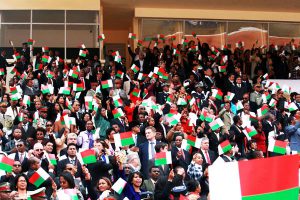June 26 Peace Love Art Activism
Anarchism
June 26, 1893: Illinois Governor John Peter Altgeld pardoned Samuel Fielden, Oscar Neebe and Michael Schwab, three men found guilty of the Haymarket bombing, effectively ending his political career. (next Anarchism, see In August)
US Labor History
June 26, 1894: the American Railway Union, led by Eugene Debs, called a general strike in sympathy with Pullman workers. (see June 28)
June 26 Peace Love Art Activism
Feminism
Republicans endorse ERA
June 26 – 28, 1944: at its convention, the Republican Party endorsed the Equal Rights Amendment. (see Feminism July 19 – 21, 1944)
United States v. Virginia
June 26, 1996: the Supreme Court ruled that the all-male Virginia Military School had to admit women in order to continue to receive public funding. It held that creating a separate, all-female school would not suffice. [Oyez article] (see Aug 29)
June 26 Peace Love Art Activism
Cold War
Berlin airlift
June 26, 1948: US General Lucius Clay gave the order for the Berlin Airlift (only afterwards receiving authorization from President Truman). This act of defiance against the Soviets was an incredible feat of logistics (at one point cargo planes landed at Tempelhof every four minutes, twenty four hours a day), a defining moment of the Cold War, and a demonstration of American support for the citizens of Berlin. [US Office of the Historian article] (Red Scare, see July 2, 1948; Berlin Airlift, see May 12, 1949)
Congress for Cultural Freedom
June 26, 1950: The Congress for Cultural Freedom was a liberal anti-Communist group that was secretly funded by the CIA. The Congress was designed to offset the impact of international conferences and events sponsored by the Soviet Union. While some leaders of the Congress were “witting” (the term then used for those knowledgeable about the secret practices), many people who participated in its events were not, and were embarrassed when the secret role of the CIA was exposed in the 1960s. [CIA article] (Red Scare, etc, see June 29; CCF, see February 15, 1967)
Cole v. Young
June 26, 1956: Senators Joe McCarthy and James O. Eastland of Mississippi attacked the Supreme Court (“One pro-Communist decision after another”) for a series of pro-civil liberties decisions. Specifically, they were incensed by the Court’s decision in Cole v. Young just two weeks earlier, on June 11, 1956. [Oyez article] (see July 23)
Ich bin ein Berliner
June 26, 1963: President Kennedy spoke in Berlin, West Germany. He reaffirmed American solidarity declaring, “Ich bin ein Berliner” [Atlantic article] (see Aug 30)
June 26 Peace Love Art Activism
BLACK HISTORY
School Desegregation
June 26, 1959: Prince Edward County closed its schools to avoid the desegregation ordered by the Virginia Supreme Court. Five years later (see May 25, 1964), the U.S. Supreme Court ordered the public school system reopened. (BH, see July 14: SD, see January 11, 1960)
Medgar Evers murder trial
June 26, 1963: the federal government dropped its civil rights charges against De La Beckwith in view of Mississippi’s plans to prosecute him for the murder of Medgar Evers. (BH, see “in July”; Evers, see July 2)
James Meredith
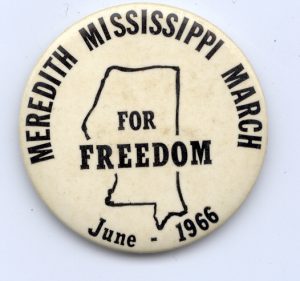 June 26, 1966: Meredith, along with nearly 15,000 marchers, ended the civil rights march in Jackson, MS. (see January 1967).
June 26, 1966: Meredith, along with nearly 15,000 marchers, ended the civil rights march in Jackson, MS. (see January 1967).
James C. Anderson murdered
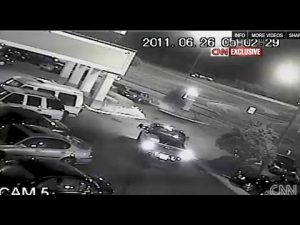 June 26, 2011: James Anderson was standing near his car at a Jackson, Mississippi motel about 5 a.m. Two carloads of teenagers pulled off the Interstate and into the motel parking lot. Several jumped from the vehicles and beat Anderson. A white sport utility vehicle drove away. As Anderson stumbled along the edge of the parking lot, the police said, the driver of a green Ford F250 pickup truck, Deryl Dedmon, accelerated and drove over him. Mr. Anderson was pronounced dead at a local hospital. (see Aug 7)
June 26, 2011: James Anderson was standing near his car at a Jackson, Mississippi motel about 5 a.m. Two carloads of teenagers pulled off the Interstate and into the motel parking lot. Several jumped from the vehicles and beat Anderson. A white sport utility vehicle drove away. As Anderson stumbled along the edge of the parking lot, the police said, the driver of a green Ford F250 pickup truck, Deryl Dedmon, accelerated and drove over him. Mr. Anderson was pronounced dead at a local hospital. (see Aug 7)
Philando Castile
June 26, 2017: Valerie Castile, the mother of Philando Castile, the black motorist killed last summer by a police officer from St. Anthony, Minn., reached a nearly $3 million settlement with that city.
The settlement came 10 days after the officer who fired the fatal shots, Jeronimo Yanez, was acquitted of second-degree manslaughter and all other charges. Mr. Castile’s case is the latest example of a police shooting of a black person leading to a legal settlement but no criminal conviction of the officer involved. (see June 29)
Timothy Coggins
June 26, 2018: Frank Gebhardt, 60, was convicted of murder, battery, assault and other charges in the killing of Timothy Coggins. He was sentenced to life plus 30 years in prison.
“Hopefully, sir, you have stabbed your last victim,” Judge W. Fletcher Sams of Spalding County Superior Court said as he handed down the sentence.
The other murder defendant, Bill Moore — Mr. Gebhardt’s brother-in-law — is awaiting trial later this year. (BH, see July 3)
June 26 Peace Love Art Activism
INDEPENDENCE DAY
June 26, 1960: Madagascar independent from France. [Global Security dot org article] (see IDs for list of independence days from that decade)
June 26 Peace Love Art Activism
June 26 Music et al
Quarter to Three
June 26 – July 9, 1961, “Quarter to Three” by Gary U.S. Bonds #1 Billboard Hot 100.
A Hard Day’s Night
June 26, 1964: US release of A Hard Day’s Night album by United Artists Records in both mono and stereo, the fourth Beatles album in the US. The album went to number one on the Billboard album chart, spending 14 weeks there, the longest run of any album that year.
All seven songs from the film were featured along with “I’ll Cry Instead”, which, although written for the film, was cut at the last minute. The American version also included four easy listening-styled instrumental versions of Lennon and McCartney songs arranged by George Martin conducting an orchestra of studio musicians: “I Should Have Known Better,” “And I Love Her,” “Ringo’s Theme,” and “A Hard Day’s Night.” (see June 27 – July 3)
Mr. Tambourine Man
June 26 – July 2, 1965: “Mr. Tambourine Man” by the Byrds #1 on the Billboard Hot 100. Helped introduce many to Bob Dylan. (see In July)
https://www.youtube.com/watch?v=f7eJSdpMEnI
The [bumpy] Road to Bethel on June 26, 1969
Woodstock Ventures held a media meeting at the Village Gate on Bleeker Street to cooperatively present, discuss, and formulate “ground rules for outdoor peace and music programs.” In the end it was agreed that the festival was to emphasize music and not politics.
On that same day the Wallkill town attorney presented Woodstock Ventures with a document outlining proposed ordinances regarding assemblies of 5,000 people or more. Such proposals such as not light, sound, or odor seepage beyond the festival’s specific boundaries created seemingly insurmountable barriers to the event. Wallkill expected Woodstock Ventures to present the application for the event covering all the details no later than July 2. (see Chronology for expanded story)
June 26 Peace Love Art Activism
Vietnam
June 26, 1965: Gen. William Westmoreland, senior U.S. military commander in Vietnam, was given formal authority to commit American troops to battle when he decided they were necessary “to strengthen the relative position of the GVN [Government of Vietnam] forces.” This authorization permitted Westmoreland to put his forces on the offensive. Heretofore, U.S. combat forces had been restricted to protecting U.S. airbases and other facilities. (see June 28)
June 26 Peace Love Art Activism
FREE SPEECH
June 26, 1972: Rosenfeld v New Jersey. At a school board meeting, David Rosenfeld was arrested for calling teachers, the school board, and others “motherfuckers.” The Supreme Court overruled the conviction. [Justia article] (see March 19, 1973)
June 26 Peace Love Art Activism
Watergate scandal
June 26, 1973: former White House counsel John W. Dean told the Senate Watergate Committee about an “enemies list” kept by the Nixon White House. (see June 27)
June 26 Peace Love Art Activism
Technological Milestone
 June 26, 1974: the supermarket price scanner made its debut in Troy, Ohio, as a 10-pack of Wrigley’s Juicy Fruit chewing gum costing 67 cents and bearing a Uniform Product Code (UPC) was scanned by Marsh Supermarket cashier Sharon Buchanan for customer Clyde Dawson. (The barcoded package of never-chewed gum is on display at the Smithsonian Institution’s National Museum of American History in Washington, D.C.) (see January 21, 1976)
June 26, 1974: the supermarket price scanner made its debut in Troy, Ohio, as a 10-pack of Wrigley’s Juicy Fruit chewing gum costing 67 cents and bearing a Uniform Product Code (UPC) was scanned by Marsh Supermarket cashier Sharon Buchanan for customer Clyde Dawson. (The barcoded package of never-chewed gum is on display at the Smithsonian Institution’s National Museum of American History in Washington, D.C.) (see January 21, 1976)
June 26 Peace Love Art Activism
ADA
June 26, 1975: in O’Connor v. Donaldson the Supreme Court ruled that a state cannot confine a mentally ill person who is not a danger to the community and who can survive in the community by themself or with the assistance of others. Kenneth Donaldson had been held for 15 years in a Florida State institution for the mentally ill. He was confined with dangerously mentally ill persons in an understaffed ward that had only one doctor (an obstetrician) for about 1,000 inmates.
The Court: “May the State fence in the harmless mentally ill solely to save its citizens from exposure to those whose ways are different? One might as well ask if the State, to avoid public unease, could incarcerate all who are physically unattractive or socially eccentric. Mere public intolerance or animosity cannot constitutionally justify the deprivation of a person’s physical liberty.” [Oyaz article] (see April 5, 1977)
June 26 Peace Love Art Activism
Native Americans
Leonard Peltier
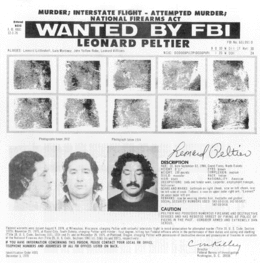 June 26, 1975: Special Agents Jack R. Coler and Ronald A. Williams, two FBI agents, entered Jumping Bull Ranch where a large number of AIM supporters, invited there for protection by the Jumping Bull elders, camp. A shootout ensued and the two agents were killed.
June 26, 1975: Special Agents Jack R. Coler and Ronald A. Williams, two FBI agents, entered Jumping Bull Ranch where a large number of AIM supporters, invited there for protection by the Jumping Bull elders, camp. A shootout ensued and the two agents were killed.
One of the AIM defenders, Leonard Peltier, was later captured in Canada, extradited and convicted for murder by an all-white jury. Activists continue to campaign for his exoneration and release while Peltier serves two consecutive life terms in federal prison. (next NA, see below; next Peltier, see July 25, 1979)
NAPT
In 1976, the Corporation for Public Broadcasting established Native American Public Telecommunications, Inc. to promote, produce and distribute Native American television and radio programming.[Indian Country article] (next NA, see September 13, 1976)
June 26 Peace Love Art Activism
LGBTQ
Anita Bryant protest
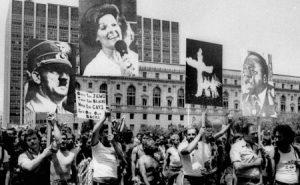 June 26, 1977: some 200,000 protesters march through the streets of San Francisco, protesting Anita Bryant’s anti-gay remarks and the murder of Robert Hillsborough. (see Oct 14)
June 26, 1977: some 200,000 protesters march through the streets of San Francisco, protesting Anita Bryant’s anti-gay remarks and the murder of Robert Hillsborough. (see Oct 14)
Lawrence v. Texas
June 26, 2003: the US Supreme Court, in a 6–3 ruling struck down the sodomy law in Texas and, by extension, invalidated sodomy laws in thirteen other states, making same-sex sexual activity legal in every U.S. state and territory. The Court overturned its previous ruling on the same issue in the 1986 case Bowers v. Hardwick, where it upheld a challenged Georgia statute and did not find a constitutional protection of sexual privacy. [Oyez article] (see Aug 5)
LGBTQ June 26, 2015
- Obergefell et al v Hodges, Director, Ohio Department of Health, et al
The US Supreme Court ruled that the Constitution guarantees a nationwide right to same-sex marriage. Justice Anthony M. Kennedy wrote the majority opinion in the 5 to 4 decision. He was joined by the court’s four more liberal justices.
Justice Kennedy said gay and lesbian couples have a fundamental right to marry.
“No union is more profound than marriage, for it embodies the highest ideals of love, fidelity, devotion, sacrifice, and family,” he wrote. “In forming a marital union, two people become something greater than once they were.”
“It would misunderstand these men and women to say they disrespect the idea of marriage,” Justice Kennedy said of the couples challenging state bans on same-sex marriage. “Their plea is that they do respect it, respect it so deeply that they seek to find its fulfillment for themselves. Their hope is not to be condemned to live in loneliness, excluded from one of civilization’s oldest institutions. They ask for equal dignity in the eyes of the law. The Constitution grants them that right.” [Oyez article]
- Most States immediately comply
In Georgia, Gov. Nathan Deal (R) said the state “is subject to the laws of the United States” and a judge at a county court in Atlanta began performing the state’s first gay marriages.
Michigan Gov. Rick Snyder (R) urged compliance with the ruling, asking the state to “treat everyone with the respect and dignity they deserve.”
Alabama’s attorney general, Luther Strange (R), issued a statement acknowledging that “the U.S. Supreme Court’s ruling is now the law of the land” and pledged to enforce the ruling, though some counties in the state had stopped issuing all marriage licenses in an effort to avoid allowing gay marriages. (see June 28)
Free Speech vs Gay Rights
June 30, 2023: the Supreme Court sided with a web designer in Colorado who said she had a First Amendment right to refuse to design wedding websites for same-sex couples despite a state law that forbids discrimination against gay people.
Justice Neil M. Gorsuch, writing for the majority in a 6-3 vote, said that the First Amendment protected the designer, Lorie Smith, from being compelled to express views she opposed.
“A hundred years ago, Ms. Smith might have furnished her services using pen and paper,” he wrote. “Those services are no less protected speech today because they are conveyed with a ‘voice that resonates farther than it could from any soapbox.’”
The case, though framed as a clash between free speech and gay rights, was the latest in a series of decisions in favor of religious people and groups, notably conservative Christians. [NYT article] (next LGBTQ+, see )
June 26 Peace Love Art Activism
DEATH PENALTY
Ford v. Wainwright
June 26, 1986: the U.S. Supreme Court held in a 5-4 vote that the execution of an insane prisoner was an unconstitutional violation of the Eighth Amendment prohibition of cruel and unusual punishment. [Oyez article] (see November 4, 1986)
Penry v. Lynaugh
June 26, 1989: the Supreme court held that executing mentally retarded persons did not violate the Eighth Amendment. [Oyez article] (DP, see September 13, 1994; 8th, see March 1, 2005)
June 26 Peace Love Art Activism
IRAQ
June 26, 1993: President Clinton ordered a cruise missile attack on Iraqi intelligence headquarters in the Al-Mansur District of Baghdad, in response to an Iraqi plot to assassinate former. President George H. W. Bush during his visit to Kuwait in mid-April.[Politico article] (October 8, 1994)
June 26 Peace Love Art Activism
Jack Kevorkian
“suicide clinic”
June 26, 1995: opened a “suicide clinic” in an office in Springfield Township, Michigan. Erika Garcellano, a 60-year-old Kansas City, Missouri, woman with ALS, is the first client. A few days later, the building’s owner kicks out Kevorkian. (see JK for expanded story)
Washington v. Glucksberg
June 26, 1997: the U.S. Supreme Court rules unanimously that state governments have the right to outlaw doctor-assisted suicide. The Court had been asked to decide whether state laws banning the practice in New York and Washington were unconstitutional. [Oyez article] (see Oct 27)
June 26 Peace Love Art Activism
Student Rights
Vernonia School District 47J v. Acton, 515 U.S. 646
June 26, 1995: the U.S. Supreme Court upheld the constitutionality of random drug testing regimen implemented by the local public schools in Vernonia, Oregon. Under that regimen, student athletes were required to submit to random drug testing before being allowed to participate in sports. During the season, 10% of all athletes were selected at random for testing. The Supreme Court held that although the tests were searches under the Fourth Amendment, they were reasonable in light of the schools’ interest in preventing teenage drug use. [Justia article] (see June 10, 1996; 4th, see June 27, 2002)
June 26 Peace Love Art Activism
CLINTON IMPEACHMENT
June 26, 1998: Ken Starr presented arguments to a federal appeals court requesting that Secret Service personnel be required to testify in the Lewinsky case. Linda Tripp is called to appear before the grand jury on Tuesday, June 30. (see Clinton for expanded story)
June 26 Peace Love Art Activism
Crime and Punishment
June 26, 2015: the US Supreme court decided 8 – 1 in the Johnson v. United States case that a section of the Armed Career Criminal Act, which is used to extend prison sentences, was “unconstitutionally vague.” The ruling may compel Congress to address the language of the law as thousands of prisoners would seek to have their sentences reduced.
Conservative Justice Antonin Scalia wrote the majority opinion for the court and ruled that the residual clause of the ACCA was a violation of due process: “Nine years’ experience trying to derive meaning from the residual clause convinces us that we have embarked upon a failed enterprise. Each of the uncertainties in the residual clause may be tolerable in isolation, but “their sum makes a task for us which at best could be only guesswork.” United States v. Evans [(1948). Invoking so shapeless a provision to condemn someone to prison for 15 years to life does not comport with the Constitution’s guarantee of due process.” [Justia article] (see Oct 6)
June 26 Peace Love Art Activism
SEPARATION OF CHURCH AND STATE
June 26, 2017: in Trinity Lutheran v. Comer, the Supreme Court ruled that efforts at separating church and state go too far when they deny religious institutions access to government grants meant for a secular purpose.
In siding with a Missouri church that had been denied money to resurface its playground, the court ruled 7-2 that excluding churches from state programs for which other charitable groups are eligible is a violation of the Constitution’s protection of the free exercise of religion.
“The consequence is, in all likelihood, a few extra scraped knees,” wrote Chief Justice John G. Roberts Jr. “But the exclusion of Trinity Lutheran from a public benefit for which it is otherwise qualified, solely because it is a church, is odious to our Constitution all the same, and cannot stand.” [Oyez article] (see Sept 30)
June 26 Peace Love Art Activism
Immigration History
June 26, 2017: the Supreme Court permitted a scaled-back version of President Trump’s ban on travelers from six mostly Muslim countries to take effect, deciding to hear the merits of the case in the fall but allowing Trump for now to claim a victory in the legal showdown.
The court’s unsigned order delivered a compromise neither side had asked for: It said the government may not bar those with a “bona fide” connection to the United States, such as having family members here, or a job or a place in an American university.
But the justices indicated that courts had gone too far in completely freezing Trump’s order banning new visas for citizens of six countries — Libya, Iran, Somalia, Sudan, Syria and Yemen — for 90 days and putting the refugee program on hold for 120 days. [Washington Post article] (see July 12)
States sue Trump
June 26, 2018: seventeen U.S. states sued over the federal government’s controversial policy of separating undocumented children from parents, intensifying an ongoing legal fight just hours after President Donald Trump scored a major victory on his travel ban. A complaint calling the policy unconstitutional was filed Tuesday in federal court in Seattle by states including Washington, California, New York and Pennsylvania, as well as the District of Columbia. The joint effort by the Democratic state attorneys general mirrors the battle over Trump’s travel ban against several Muslim-majority countries — a battle the states lost Tuesday in a 5-4 U.S. Supreme Court ruling along ideological lines. The states allege the border policy violates immigrants’ Fifth Amendment rights to equal protection under the law and due process. The policy also runs afoul of the federal Administrative Procedure Act and U.S. asylum laws, the states say.
Trump v Hawaii
June 26, 2018: in Trump v Hawaii, the US Supreme Court upheld President Trump’s ban on travel from several predominantly Muslim countries, delivering to the president a political victory and an endorsement of his power to control immigration at a time of political upheaval about the treatment of migrants at the Mexican border.
In a 5-to-4 vote, the court’s conservatives said that the president’s power to secure the country’s borders, delegated by Congress over decades of immigration lawmaking, was not undermined by Trump’s history of incendiary statements about the dangers he said Muslims pose to the US. (see July 5)
Japanese Internment Camps
June 26, 2018: an unexpected effect of the ruling was the official overruling of Korematsu—which upheld the exclusion of persons of Japanese ancestry, including US citizens, from their west coast homes during World War II. Although Korematsu had been widely condemned, the Court had never formally overruled it. Quoting Justice Jackson’s dissent, Chief Justice Roberts took “the opportunity to make express what is already obvious: Korematsu was gravely wrong the day it was decided, has been overruled in the court of history, and—to be clear—’has no place in law under the Constitution.’ ” (next JIC, see June 11, 2019)
Nationwide Injunction
June 26, 2018: Judge Dana M. Sabraw of the Federal District Court in San Diego issued a nationwide injunction temporarily stopping the Trump administration from separating children from their parents at the border and ordered that all families already separated be reunited within 30 days.Sabraw said children under 5 must be reunited with their parents within 14 days and he ordered that all children must be allowed to talk to their parents within 10 days.The judge wrote taht “The unfortunate reality is that under the present system, migrant children are not accounted for with the same efficiency and accuracy as property.” (next IH, see July 5; next Judge Sabraw, see July 16)
June 26 Peace Love Art Activism
Women’s Health
NIFL v AG of CA
June 26, 2018: ruling for opponents of abortion on free speech grounds, the US Supreme Court said in National Institute of Family and Life v Attorney General of Californina that the State of California may not require religiously oriented “crisis pregnancy centers” to supply women with information about how to end their pregnancies. The case was a clash between state efforts to provide women with facts about their medical options and First Amendment rulings that place limits on the government’s ability to compel people to say things at odds with their beliefs. (see June 29)
Affordable Care Act
June 26, 2018: students at the University of Notre Dame sued the Indiana school and the Trump administration over a move this year to drop coverage for some forms of birth control from the university’s health insurance plan, citing religious objections. The lawsuit, filed in federal court in South Bend, Indiana, where the school is located, asked the court to block the school from enforcing the new Notre Dame said it would seek to have the suit dismissed. (WH, see June 29; ACA, see July 24)
June 26 Peace Love Art Activism
Cannabis
June 26, 2018: voters in Oklahoma approved a ballot measure making the state the 30th in the nation to allow broad access to medical marijuana. (see July 24 or see CCC for expanded cannabis chronology)
June 26 Peace Love Art Activism
Voting Rights
June 28, 2023: the Supreme Court lifted its hold on a Louisiana political remap case, increasing the likelihood that the Republican-dominated state will have to redraw boundary lines to create a second mostly Black congressional district.
For more than a year, there had been a legal battle over the GOP-drawn political boundaries, with a federal judge, Democratic Gov. John Bel Edwards and opponents saying that the map is unfair and discriminates against Black voters.
The map, which was used in Louisiana’s November congressional election, had white majorities in five of six districts, all currently held by Republicans. This is despite Black people accounting for one-third of the state’s population. Another mostly Black district could deliver another congressional seat to Democrats. [AP article] (next VR, see June 27)



